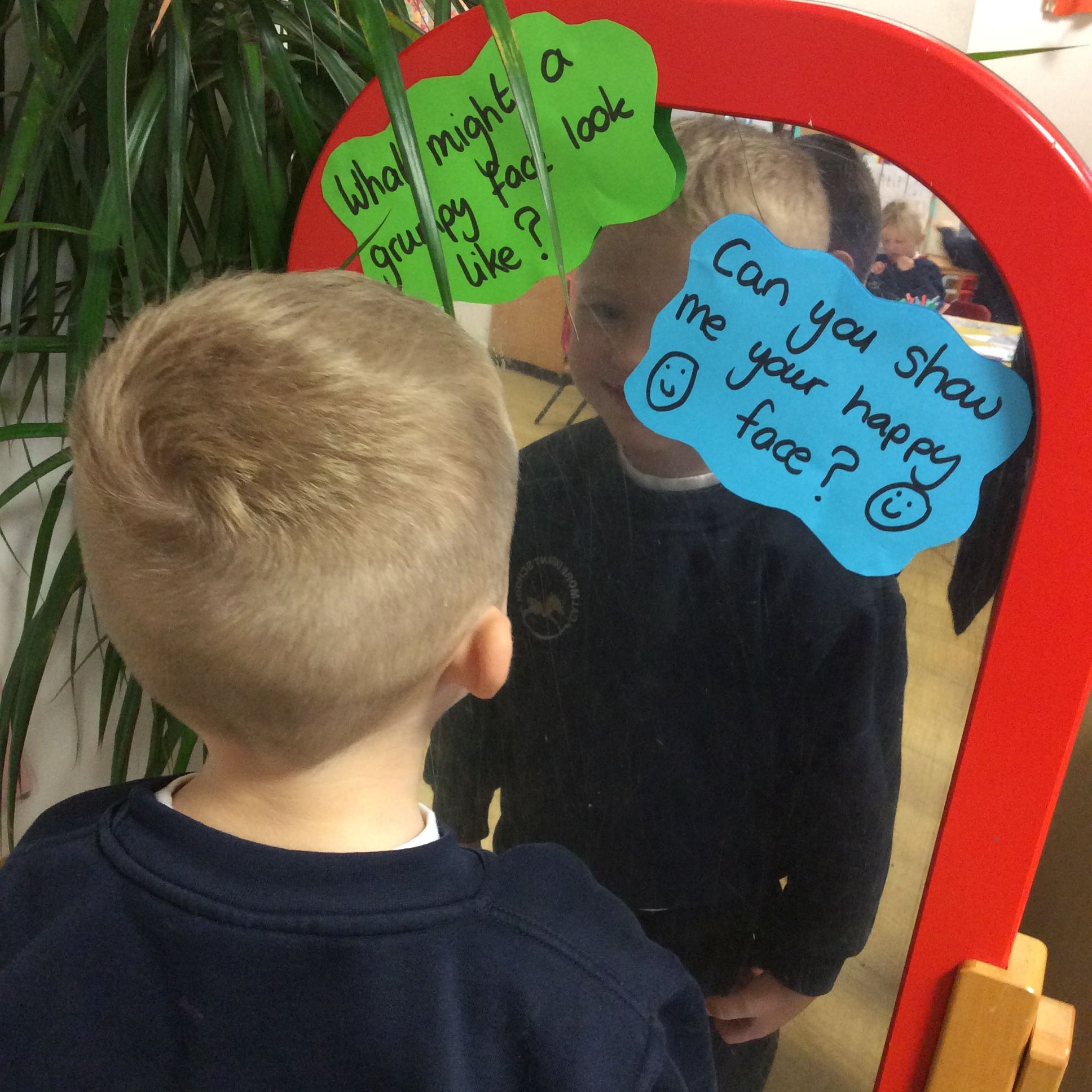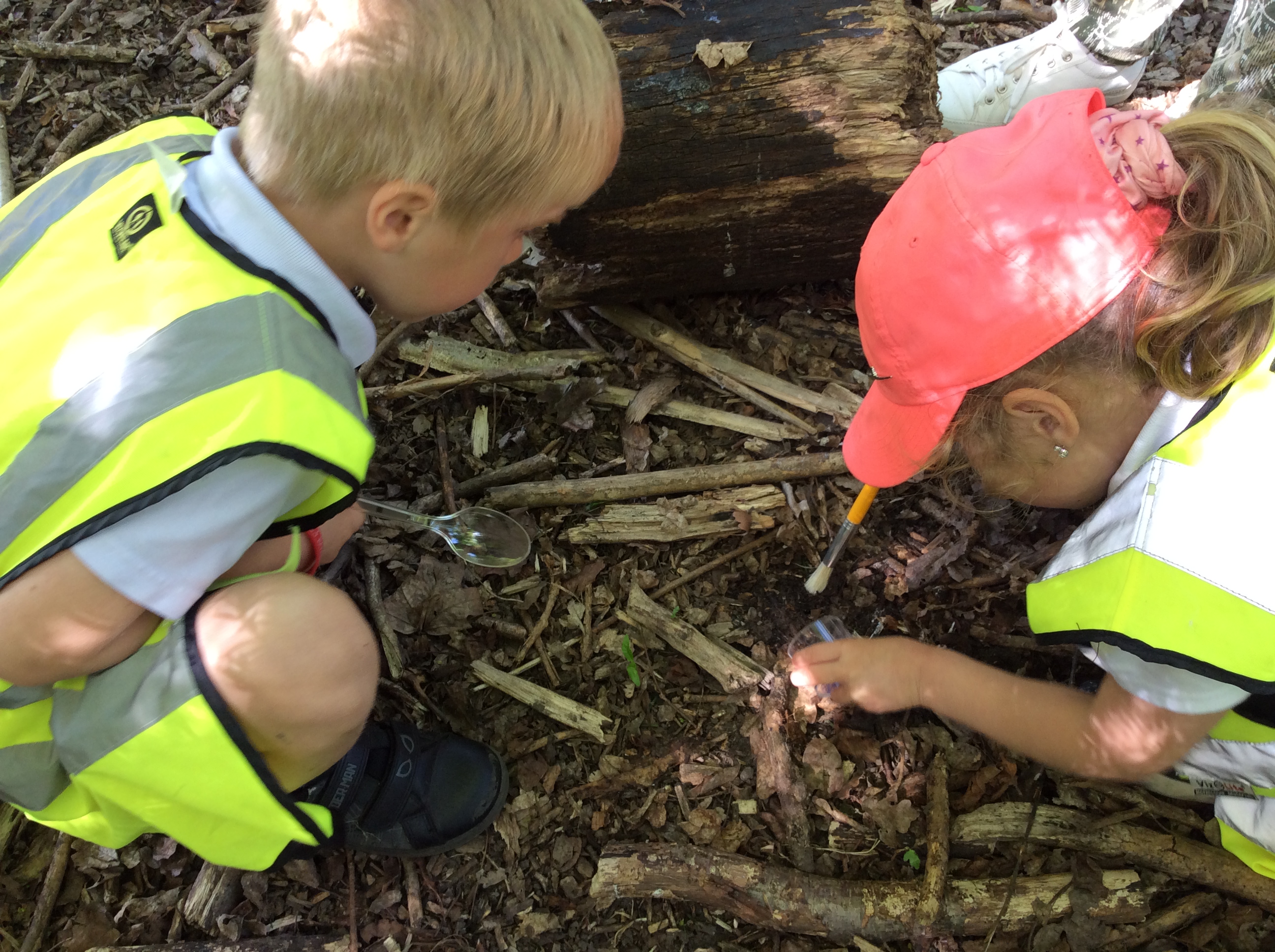Nurture Group
Rainbows Nurture Group at Calmore Infant School
Nurture Group takes place in the Rainbow Room. The Nurture room is designed to be a bridge between home and school; a place where children can feel safe and secure and therefore develop their individual needs further.
The Rainbow room has a table to share snacks, a sofa and book corner to enjoy reading and listening to a book; role play to develop imaginative play with others, tables and carpet space to play games and work collaboratively plus a kitchen area to prepare snacks. The room has direct access to outdoor play space.
Children are in nurture for a limited time (typically no more than 2 terms depending on their level of need) and are transitioned back to class when assessments show appropriate progress has been made for them to be successful, independent learners.
What is the purpose of Nurture Group & its Philosophy?
Nurture Group is a small class of pupils (8-10). Its composition is carefully well-thought-out to create a balanced and functional group. Its purpose is to offer children opportunities to re-visit early learning skills and promote and support their social and emotional development. There is much research evidence that children’s learning is most effective when they have a sense of emotional well-being, good self-esteem and a feeling of belonging to their school community. The Nurture Room provides children with this opportunity and so helps to develop their maturity and resilience.
Nurture is not about excluding children from a quality education, it is about providing a bespoke curriculum that will ensure children have the opportunity to develop their social skills and emotional awareness. This will give them the highest chance for success in the classroom. Staff and governors will monitor the impact on learning. The Nurture Room is a place of learning.
The philosophy of the Nurture Room is drawn from the principles established by the work of Marjorie Boxall and others, and exemplified by ‘The Nurture Group Network’.
-
The Nurture Group Principles:
- Children’s learning is understood developmentally
- The classroom offers a safe base
- All behaviour is communication
- The importance of transition in children’s lives
- Has an adult/child ratio of no more than 1:5, and provides lots of opportunities for speaking and listening activities
- Builds a child’s self-esteem and confidence
- Builds skills for classroom learning
- Language is a vital means of communication
How does Calmore Infant School Nurture Group operate?
Our ‘Rainbow group’ operates 4 afternoons a week 1-3pm.
It is staffed by two highly qualified LSA’s who attended the Nurture Group training in April 2020.
The SENCO oversees the running of the group, ensuring regular observations, tracking the progress of the children, liaising with all members of staff and parents; supporting the Nurture Staff; selecting the children and overseeing the resettlement/transition of the children.
Before children attend nurture provision, parents are informed by the class teacher and are given a parents leaflet and letter with more information. Parents are requested to sign a permission slip before their child can attend.
Who is Nurture Group for?
Children may attend sessions in the Nurture Group for specific reasons, such as:
- Friendship difficulties – keeping/making friends
- Quiet, shy, withdrawn
- Find it hard to listen to others or join in
- Disruptive towards others
- Find it hard to accept losing a game
- Find it hard to share and take turns
- Find it difficult to cope in the classroom
- Low self esteem
- Find it hard to manage their emotions appropriately
What is a Nurture Group?
Calmore Infant School’s Nurture Group is a class:
- Of around 8 – 10 children.
- Taught by 2 members of staff.
- Providing play based opportunities to help children learn to negotiate, turn take, share, listen to others, concentrate and plan.
- Providing bespoke teaching activities suited to individual needs based on their Boxall Assessment (see below).
- Rich texts (fiction and non-fiction) are used to inspire and promote learning.
- Providing children with a chance to develop positive relationships with the teaching staff and each other.
- Promoting children’s self-esteem and build their confidence.
- Where snack time is used to help with social learning and encouraging children to attend to the needs of others.
- Closely linked with the child’s mainstream class and children remain members of both classes.
- Helps with transitions e.g new class/new school.
What difference does Calmore Infant School Nurture Group make?
Children that have attended our Nurture Group have developed their:
- Confidence and self-esteem
- Belief in themselves as learners, which can impact hugely on their academic success
- Language, literacy and maths skills
- Friendships
- Enjoyment of school
- Concentration
- Management of emotions including sharing/turn taking
What assessment do you use to inform planning and next steps?
Our Nurture Group is bespoke to each individual child, therefore planning will be specific to develop individual needs based on their assessment of the Boxall Profile. The children will be assessed from the Boxall Profile which assesses their social, emotional and behavioural development.
The Boxall Profile identifies the levels of skills the children and young people possess to access learning. Sometimes children are insecure about their worth, often not able to articulate their feelings. Instead, they show their discomfort by withdrawal, achieving much less than they could, and unable to form good relationships. Others may act out their feelings of anger. Whatever the behaviour, the result is that they do not get positively engaged in education. Understanding what lies behind this can make all teachers much more confident in their class management, which is where the Boxall Profile comes in.
How long will my child be in Nurture Group?
It depends on the need of the child. We will use the Boxall Profile to assess the child’s area of need before they start Nurture Group. We then continue to assess from the Boxall Profile (approximately termly) to track their progress and set new targets. Typically, a child is in nurture group for around two terms, but it is different for every child.
How do Nurture staff communicate with class teachers?
To ensure clear communication occurs between the nurture group staff and mainstream colleagues we do the following:
- The Nurture staff are LSA's in different year groups, so they have good liaison with the teachers in their year groups due to weekly planning meetings. They feed back any relevant information about the children in Nurture in their year groups.
- Nurture staff meet the SENCO once a week to feedback any information to be told to all staff during staff meeting.
- In our staffroom we have a whiteboard for messages and the nurture staff will use this for messages for all staff to see.
- The Nurture staff bring the children back to the classroom at home time and will liaise with staff then if necessary.
- Specific targets are set for children within our nurture group according to the children’s needs. Targets are shared with the class teacher, so they can promote and help the child work towards their targets.
What does a typical afternoon in Nurture Group look like?
Children follow a structure and routine that is clear to both staff and children which includes group listening and speaking, learning tasks, individual and shared play and social skills. The group runs on consistency, positive reinforcement and praise.
A typical afternoon session in the Rainbow Room would revolve around a linked text for the week or even half-term. All pupils would understand and work towards their individual target which is positively referred to during the afternoon and rewarded if they are seen doing it. Children have the opportunity to share good news, explore thoughts and feelings and work collaboratively on a practical task. Children work with new peers regularly, encouraging cooperation and confidence. Within the sessions, opportunities are tailored to the needs of the particular group and age range. Outdoor learning is an important part of the sessions. Children learn to share a snack together and the opportunity is given to choose and try new food; even baking them first! Children learn to share and talk together with peers and adults.
Please see examples of planning for further information.
Outside agency involvement
We work closely with a range of multi-agencies in school and within our nurture group. Observations from outside agencies regularly occur within nurture group as well as in class. For example our attached speech therapist, Jude Rosier, will observe the children within nurture group to monitor their progression with their speech programmes. She will set new targets and share with all staff. In addition to this we have outreach from our local SEN school (Forest Park) to provide outreach support for some children. She will observe them in class and within nurture and provide suggestions/strategies to support with their development and progress. The list of agencies that we have had involved include:
- Clifford Centre (Behaviour Unit)
- PEP for LAC (involved in meetings through attending and giving input towards the child’s target)
- Educational Psychologist
- Specialist Teacher
- SALT – comes in to observe children within the setting and supports with speech strategies for these children.
- Nurture group staff might attend EHCP reviews and give input from Nurture Group perspective.
Selection and Resettlement procedure
Careful thought is given to the selection of the children to avoid group dynamics that could be unsuccessful for the children. Therefore, this is closely looked at by all staff to ensure all children have the opportunity to succeed. We want the nurture group to be a secure base where the children feel safe and can begin to build relationships of trust with supportive adults. We believe a successful nurture experience builds a child’s disposition to learn and succeed in class and socially.
We work hard to make transitions as smooth as we can for the children. As a child moves to a new school, the Nurture Staff will plan a thorough transition timetable, as well as the opportunity to take photos and time to discuss their new setting. They will liaise with junior school staff/nurture staff. We also carry out internal transition visits for children who will be moving up to a new classroom and teacher to avoid children feeling anxious about such changes. When children are transitioning back into class, this is done in a careful, staged way where we can be responsive to needs as they arise and where adult support creates a bridge between the group and the mainstream classroom. We update parents regularly.
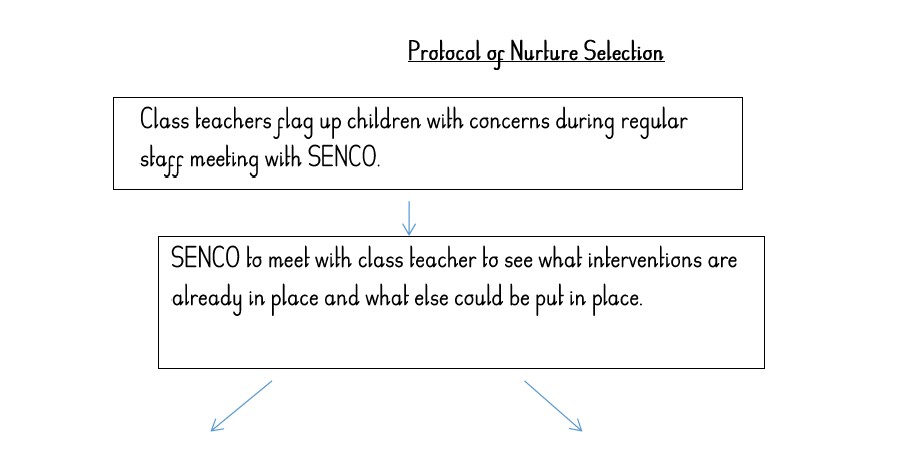
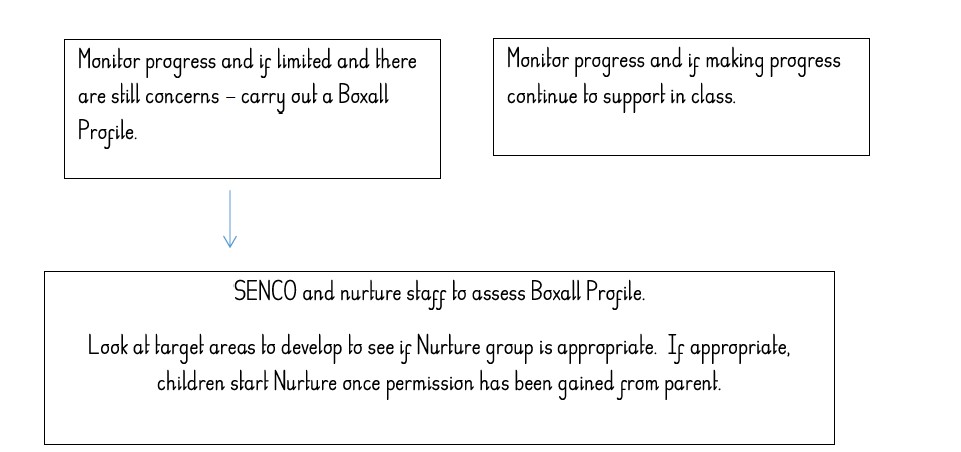
Before allocating a child a place, the team need to decide on the dynamics of the group before the final decision. This is fundamental for the success of all children within nurture group.
Resettlement back into mainstream classroom from Nurture
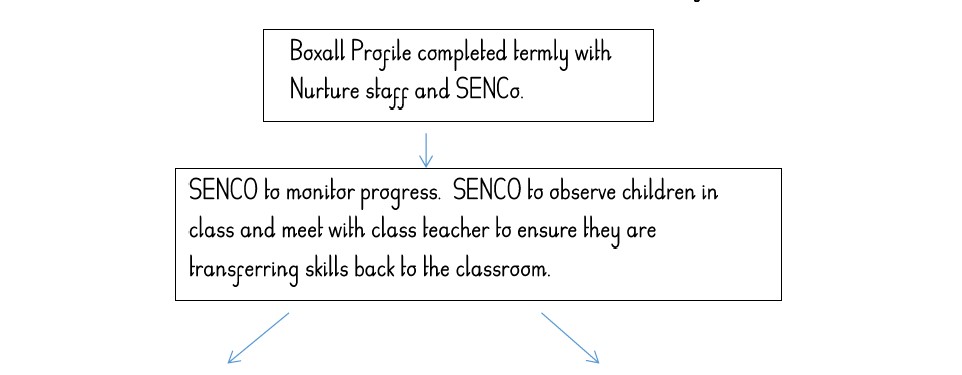
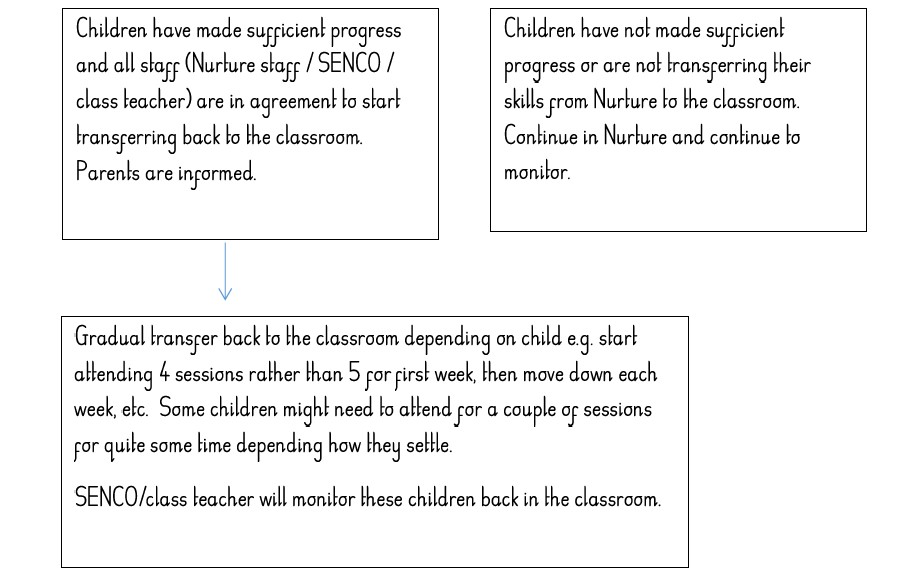
Click on the link to see our Nurture Group Leaflet.

